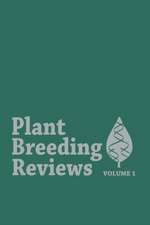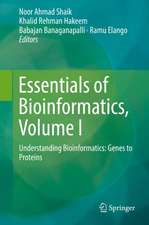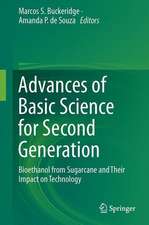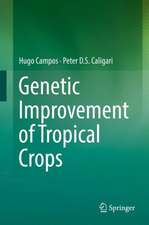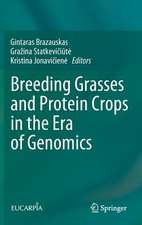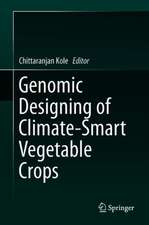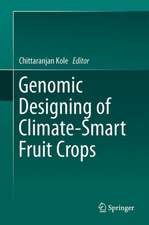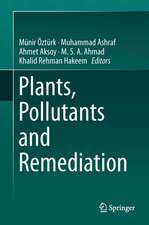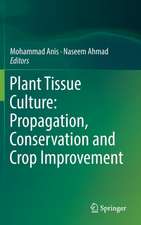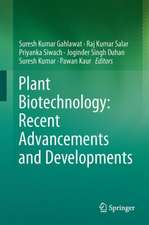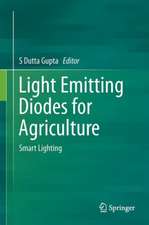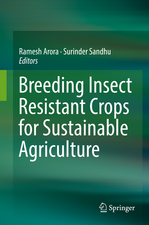Crop Improvement: New Approaches and Modern Techniques
Editat de Khalid Rehman Hakeem, Parvaiz Ahmad, Munir Ozturken Limba Engleză Paperback – 9 iul 2015
Toate formatele și edițiile
| Toate formatele și edițiile | Preț | Express |
|---|---|---|
| Paperback (1) | 1226.90 lei 6-8 săpt. | |
| Springer Us – 9 iul 2015 | 1226.90 lei 6-8 săpt. | |
| Hardback (1) | 1231.47 lei 6-8 săpt. | |
| Springer Us – 8 iun 2013 | 1231.47 lei 6-8 săpt. |
Preț: 1226.90 lei
Preț vechi: 1496.22 lei
-18% Nou
Puncte Express: 1840
Preț estimativ în valută:
234.77€ • 244.64$ • 194.39£
234.77€ • 244.64$ • 194.39£
Carte tipărită la comandă
Livrare economică 04-18 aprilie
Preluare comenzi: 021 569.72.76
Specificații
ISBN-13: 9781489973573
ISBN-10: 1489973575
Pagini: 512
Ilustrații: XVII, 493 p. 27 illus., 15 illus. in color.
Dimensiuni: 155 x 235 x 27 mm
Greutate: 0.71 kg
Ediția:2013
Editura: Springer Us
Colecția Springer
Locul publicării:New York, NY, United States
ISBN-10: 1489973575
Pagini: 512
Ilustrații: XVII, 493 p. 27 illus., 15 illus. in color.
Dimensiuni: 155 x 235 x 27 mm
Greutate: 0.71 kg
Ediția:2013
Editura: Springer Us
Colecția Springer
Locul publicării:New York, NY, United States
Public țintă
ResearchCuprins
Chapter 1. Agrobacterium rhizogenes-Mediated Transformation and Its Biotechnological Applications in Crops.- Chapter 2. Bioinformatic Tools in Crop Improvement.- Chapter 3. Crop Improvement Through Plant Tissue Culture.- Chapter 4. Mutagenesis – A Potential Approach for Crop Improvement.- Chapter 5. Role of Bio-fertilizers in Crop Improvement.- Chapter 6. Plant-Microorganism Interactions: Effects on the Tolerance of Plants to Biotic and Abiotic Stresses.- Chapter 7. Biotic Stress and Crop Improvement: A Wheat Focus Around Novel Strategies.- Chapter 8. Variability in Fusarium Species Causing Wilt Disease in Crops: A Transcriptomic Approach to Characterize Dialogue Between Host and Pathogen.- Chapter 9. Coping Abiotic Stress with Plant Volatile Organic Chemicals (PVOCs): A Promising Approach.- Chapter 10. An Overview of Omics for Wheat Grain Quality Improvement.- Chapter 11. From Agronomy to Molecular Genetics and Proteomics in an Effort to Improve Nitrogen Use Efficiency in Crops.- Chapter 12. Arsenic Toxicity and Tolerance Mechanisms in Plants: An Overview.- Chapter 13. Arsenic Stress in Plants: An Inside Story.- Chapter 14. In vitro Production of Secondary Metabolites Using Elicitor in Catharanthus roseus: A Case Study.- Chapter 15. Handling Soybean (Glycine max L.) Under Stress.- Chapter 16. Environmental and Economical Opportunities for the Valorisation of the Genus Atriplex: New Insights.- Chapter 17. Dealing with Environmental Stresses: Role of Polyamines in Stress Responses.
Notă biografică
Textul de pe ultima copertă
The improvement of crop species has been a basic pursuit since cultivation began thousands of years ago. To feed an ever increasing world population will require a great increase in food production. Wheat, corn, rice, potato and few others are expected to lead as the most important crops in the world. Enormous efforts are made all over the world to document as well as use these resources. Everybody knows that the introgression of genes in wheat provided the foundation for the “Green Revolution”. Several factors are contributing to high plant performance under different environmental conditions, therefore an effective and complementary use of all available technological tools and resources is needed to meet the challenge.
New Approaches and Modern Techniques highlights the current status of crop productivity in the light of developments in crop biotechnology, and at the same time provides information on some recent genomic tools and novel genetic and breedingapproaches with a final aim of crop improvement. Emphasis has been laid on the topics related to advances in crop biotechnology, the key principles influencing the current practice in crop improvement programs and elucidate the nature of new approaches as well as modern techniques in crop improvement and how molecular plant breeding opens new avenues for research and is contributing to discoveries in this field.
New Approaches and Modern Techniques highlights the current status of crop productivity in the light of developments in crop biotechnology, and at the same time provides information on some recent genomic tools and novel genetic and breedingapproaches with a final aim of crop improvement. Emphasis has been laid on the topics related to advances in crop biotechnology, the key principles influencing the current practice in crop improvement programs and elucidate the nature of new approaches as well as modern techniques in crop improvement and how molecular plant breeding opens new avenues for research and is contributing to discoveries in this field.
Caracteristici
Comprehensive approach to understanding crop improvement Contributions from leading scientists worldwide Explores the role of fertilizer in improving crop yield, disease resistance, and nitrogen absorption Includes supplementary material: sn.pub/extras


